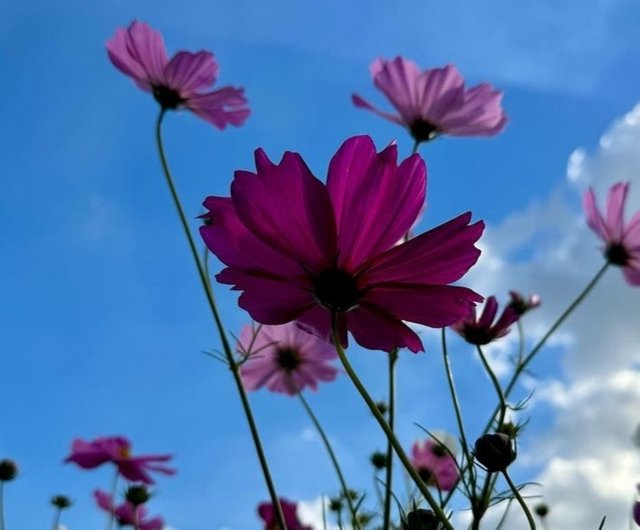



In the realm of garden flora, the cosmos flower stands out as a celestial beauty, adorning landscapes with its delicate charm and vibrant hues. With its Latin name, Cosmos bipinnatus, hinting at its divine allure, this flower has enchanted gardeners and nature enthusiasts for generations. From its origins in Mexico, where it was once revered by the Aztecs, to its global presence today, the cosmos flower continues to captivate with its ethereal presence.One of the most captivating aspects of the cosmos flower is its diverse color palette. From soft pastels to bold, vivid hues, cosmos come in a range of shades, including white, pink, red, orange, and even chocolate. This versatility allows gardeners to create stunning visual displays, whether in a monochromatic scheme or a riotous explosion of color. Their dainty petals, reminiscent of delicate brushstrokes, add an artistic flair to any garden landscape.
Beyond its aesthetic appeal, the cosmos flower carries symbolic significance in various cultures. In Greek mythology, "cosmos" translates to "order" or "harmony," reflecting the flower's association with balance and tranquility. In Victorian flower language, cosmos symbolize peacefulness and modesty, making them a popular choice for conveying messages of love and admiration.One of the cosmos flower's most endearing qualities is its ease of cultivation. These hardy annuals thrive in a wide range of soil conditions and climates, making them accessible to gardeners of all skill levels. Whether sown directly into the ground or started indoors, cosmos seeds germinate quickly, rewarding growers with a profusion of blooms from midsummer to fall. Their tolerance for drought and heat makes them a resilient choice for gardeners in hot, arid regions, while their ability to self-sow ensures a continuous cycle of beauty year after year.
In addition to their visual allure, cosmos flowers play a vital role in supporting pollinator populations. Their nectar-rich blooms attract an array of beneficial insects, including bees, butterflies, and hoverflies, making them invaluable contributors to ecosystem health. By incorporating cosmos into garden designs, enthusiasts can create sanctuaries that not only please the eye but also promote biodiversity and ecological balance.The versatility of cosmos extends beyond their role as ornamental garden plants. Their long, slender stems and feathery foliage make them ideal for cutting, adding a touch of elegance to floral arrangements and bouquets. Whether displayed on their own or combined with other garden favorites, such as zinnias, dahlias, and sunflowers, cosmos infuse any setting with a sense of natural beauty and grace.
